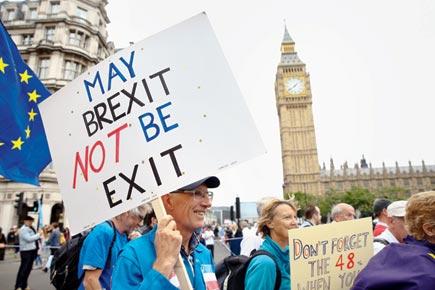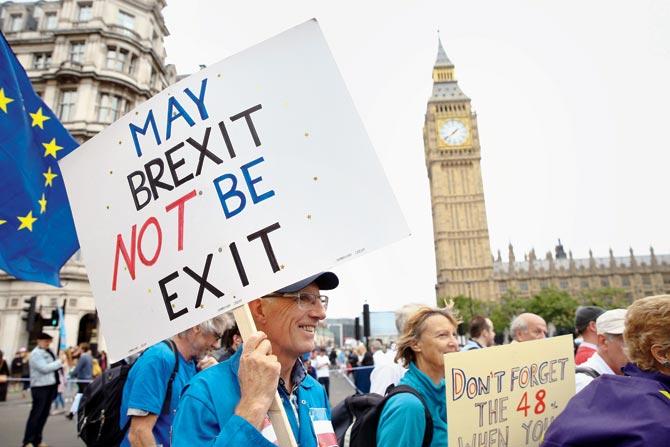The declaration of ‘post-truth’ as word of the year by the Oxford English Dictionary has been met with what-have-we-come-to resignation


Protesters against the Brexit vote march in central London on September 3, 2016 . The OED named ‘post-truth’ — a term used during the Brexit referendum and Donald Trump’s campaign — as its international word of the year. Pic/AFP
 The declaration of ‘post-truth’ as word of the year by the Oxford English Dictionary has been met with what-have-we-come-to resignation. The word’s usage by media rose by 2000% in 2016 in response to Brexit and the US polls which
The declaration of ‘post-truth’ as word of the year by the Oxford English Dictionary has been met with what-have-we-come-to resignation. The word’s usage by media rose by 2000% in 2016 in response to Brexit and the US polls which
ended with Donald Trump’s election as president.
ADVERTISEMENT
The dictionary defines the word as an adjective “denoting circumstances in which objective facts are less influential in shaping public opinion than appeals to emotion and personal belief.” In some senses, the word itself is perplexingly post-truth, seeming to rest on a belief, that truth is neutral, not neural. That people base their sense of the truth on either facts or emotions (often automatically conflated with irrationality) has in fact prevented many a commentator from understanding the “truth” of what people are feeling and to report or predict outcomes accordingly.
The assumption that certain groups of people arrive at decisions “irrationally” – the unspoken truth beneath post-truth – is a mixture of snobbery and ignorance, rather than a quest for observation and understanding. People arrive at different decisions differently – sometimes on the basis of simple facts, sometimes emotional comfort, prejudice, conditioning, exposure, habit and so on. How we make decisions in jobs, elections, relationships and consumption varies, and most of us, if we are honest, exist by heterogeneous decision-making styles.
The inability to accept the multiplicity of truths is the insistence that truth is singular, and that ‘we’ are the truly sincere who see correctly, while those we disagree with are somehow motivated or insincere, often leads to an answering flattened, homogenous response, so that everyone has their own poster-version of the truth.
What is intriguing is how this has resulted a kind of faux factuality. For instance, in the case of the ongoing demonetisation, extremist supporters of the move may become apoplectic if you mention a single story of hardship in your vicinity, immediately trying to prove you are a hypocrite of some kind. But a large number of people speak about it in a language I like to think of as techno-fable. People will explain calmly, with the assumed confidence found in business plans and resumes, how black money will be eradicated, how terrorism will end, how the digital economy will succeed as well as how R2,000 notes will be tracked by satellite. No amount of counter-factuality can make them pause and consider, even if to continue with their position, because the truth has been displaced from its in-the-middle location and there is room only for one complete truth. The “solutionist” approach of there’s-an-app-for-it has made this the lingua franca of our times.
This falsely systematic language, which has the carapace of logic but is hollow of data, nevertheless reveals different truths. People’s hatred of those who paint a depressing picture, or inability to grasp complicated structures, or the child-like desire for pastoral idylls and utopias. It is an idea of equality, which does not wish to confront the complexity of inequality, because we are not allowed to inhabit multiple identities at once – powerful in one identity (say, caste) but disempowered in another (say, gender).
The way out of these homogeneities and their resulting oppositional binaries requires systems and conversations based on a different conception and imagination of what constitutes truth. Without that, next year’s word might have to be post-stupidity.
Paromita Vohra is an award-winning Mumbai-based filmmaker, writer and curator working with fiction and non-fiction. Reach her at www.parodevipictures.com
 Subscribe today by clicking the link and stay updated with the latest news!" Click here!
Subscribe today by clicking the link and stay updated with the latest news!" Click here!







